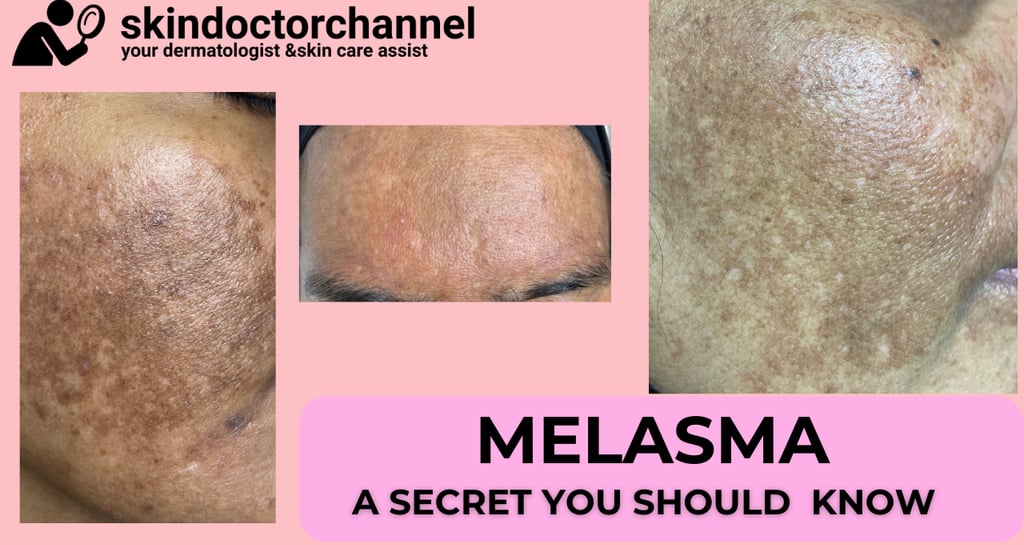Melasma - A secret you need to know before you fight it
Discover the Hidden Connection: Melasma - A Secret You Should Know Unveil the secret to radiant and even-toned skin with our latest article, "Melasma: A Secret You Should Know." Delve into the depths of this intriguing skin condition as we uncover the vital link between melasma and one often overlooked aspect of our lives – sleep. In this illuminating exploration, we unlock the role of adequate sleep in preventing and managing melasma. Dive into the world of skin health and well-being as we unravel the science behind this powerful connection and provide you with actionable insights for nurturing your skin from within. Join us on this journey to discover the hidden secret that could be the key to your skin's natural glow and vibrancy.
Dr.Sujith karimbil
8/29/20232 min read


Melasma: Unmasking the Sleep Connection Through Scientific Findings
In spite of tons of medical research, melasma stands as a complex puzzle that researchers have been diligently piecing together. Recent scientific findings are revealing a surprising connection between melasma and an essential aspect of our lives that often goes underestimated – SLEEP. As the rhythm of our internal clock, known as the circadian rhythm, holds the key to our overall well-being, it turns out that it might also hold vital clues to addressing melasma.
The Melasma Enigma: Unveiling the Culprits
Melasma, often referred to as the "mask of pregnancy," is characterized by brown or grey or even black patches that appear on the face, most commonly affecting women. While factors like sun exposure and hormonal changes have been linked to melasma, the role of the circadian rhythm and sleep disruption is an emerging area of interest.
The Circadian Rhythm: A Symphony of Balance
Our circadian rhythm is like the conductor of an orchestra, orchestrating the various functions of our body, including hormone secretion and skin repair. Disruption of this rhythm, often due to irregular sleep patterns, shift work, or late-night screen time, can lead to a cascade of consequences – one of which might be melasma.
The Melasma-Sleep Connection Unveiled
Recent scientific research has highlighted a possible correlation between melasma and circadian rhythm disruption. Studies suggest that the skin's response to UV radiation and pigmentation regulation are influenced by the circadian clock. Disruption of this clock due to inadequate or irregular sleep can potentially trigger melasma or exacerbate its symptoms.
Melatonin's Role in the Melasma Puzzle
Melatonin, the hormone that regulates sleep and wakefulness, is a key player in this puzzle. Not only does melatonin influence the circadian rhythm, but it also plays a role in antioxidant defense and pigmentation regulation. Adequate sleep and a healthy circadian rhythm support melatonin production, potentially aiding in melasma management.
The Healing Power of Sleep
As researchers delve deeper into the world of melasma, the importance of adequate sleep comes into focus as a potential therapeutic approach. While melasma treatments vary, addressing the root causes can hold the key to long-term success. Incorporating healthy sleep habits and prioritizing a stable circadian rhythm might complement existing treatments and contribute to improved outcomes.
Prevention is better than cure
A well-rested body and mind may not only help manage but even prevent the emergence of Melasma. As the adage goes, prevention is indeed better than cure, and ensuring you prioritize quality sleep can become a potent strategy in your skincare arsenal. Beyond the realm of sleep, the power of destressing practices like yoga and meditation emerges as an invaluable complement. By harmonizing these practices into your daily routine, you embark on a holistic journey towards nurturing your skin's health and unveiling its natural radiance from within
Empowering Sleep for Skin Health
As we continue to learn about the intricate dance between our skin and our internal clock, it's clear that sleep is not just a luxury – it's a necessity for skin health. Melasma serves as a reminder that our skin's well-being is intertwined with our overall wellness. Prioritizing sleep, nurturing our circadian rhythm, and seeking balance in our daily lives might hold the potential to not only manage melasma but also promote vibrant, radiant skin.
In a world where skincare routines and treatments dominate the conversation, let's not overlook the power of sleep as an essential component of our skin health. As science sheds light on the melasma-sleep connection, we're presented with an opportunity to embrace holistic approaches that empower our skin to flourish in harmony with our internal clock.
Dr.Sujith karimbil
